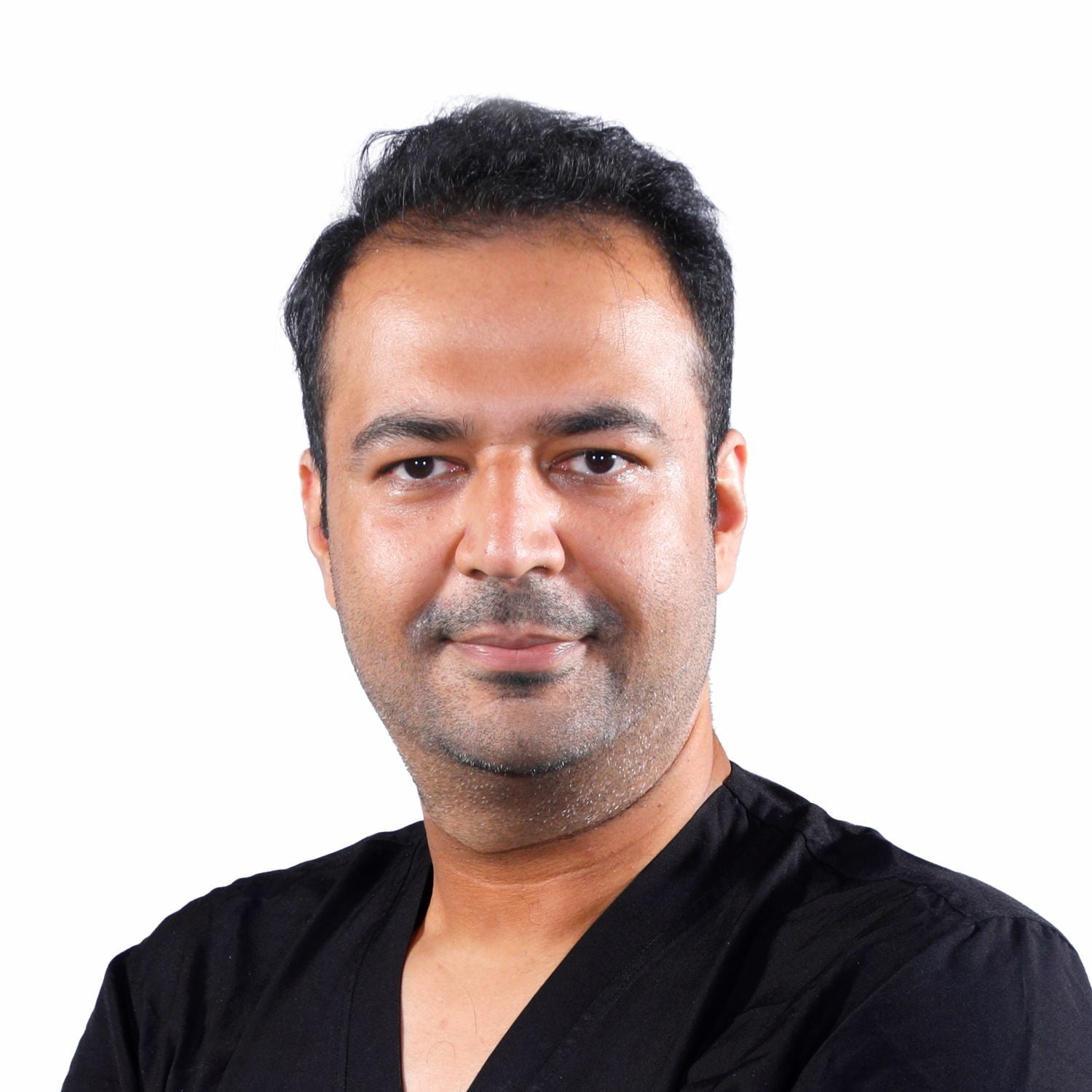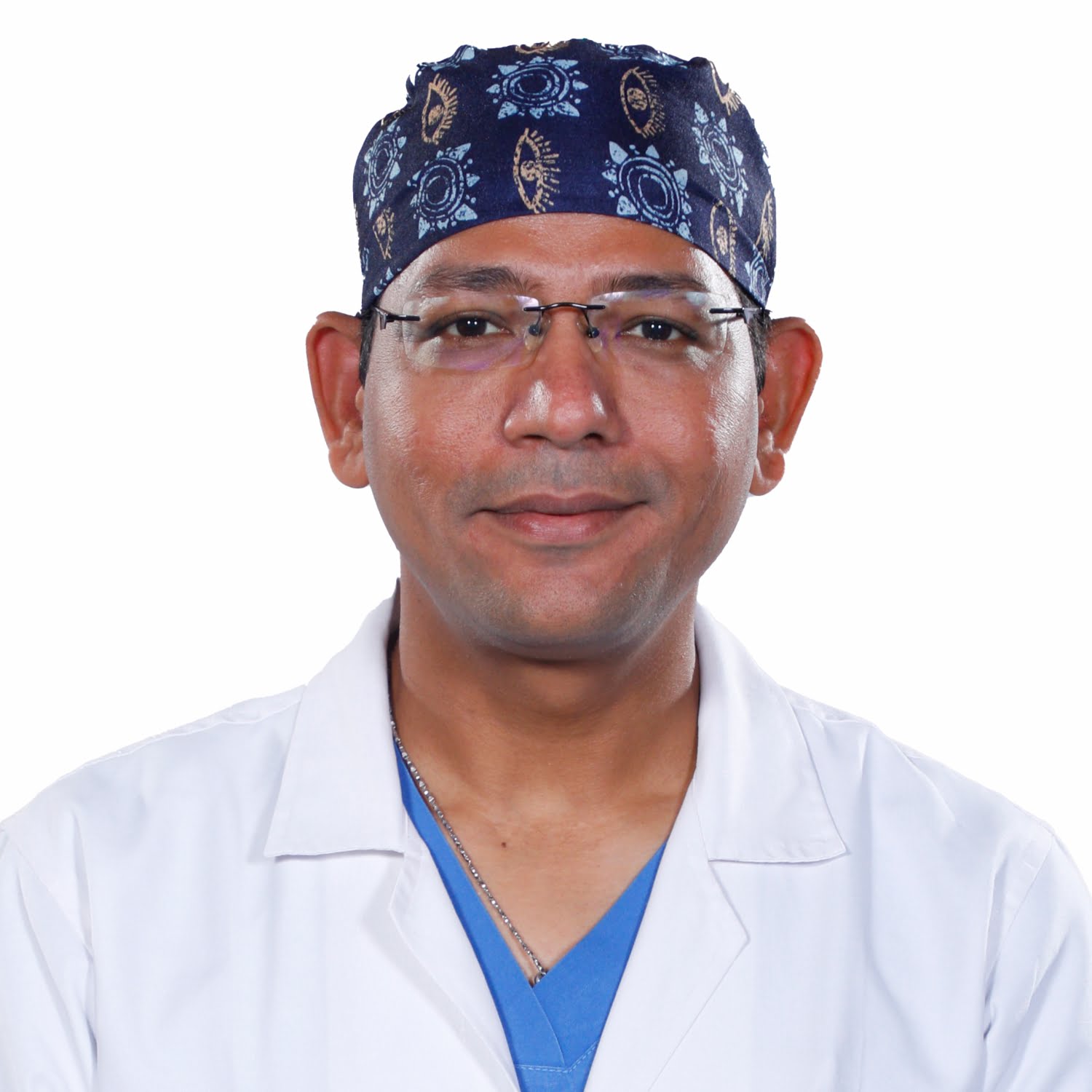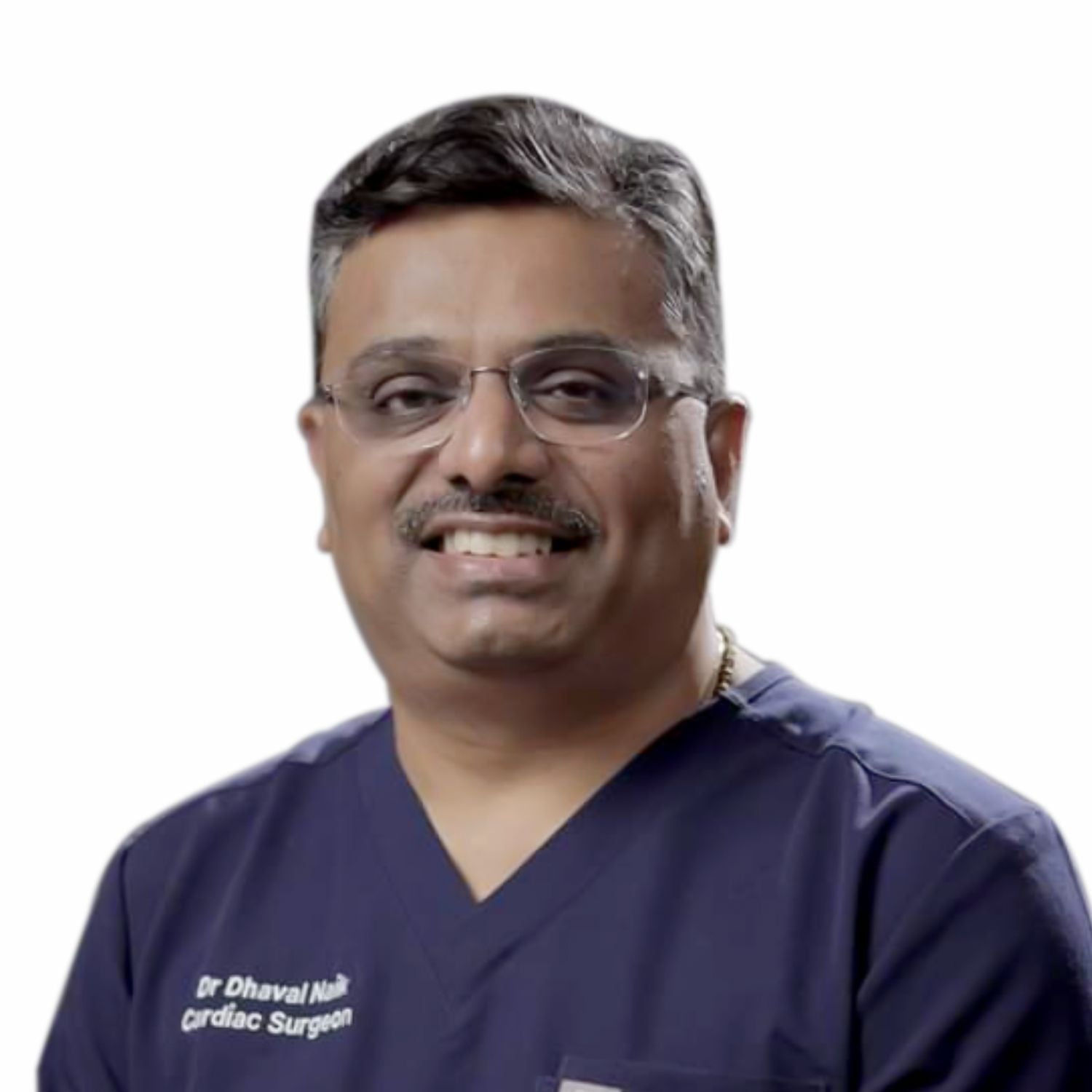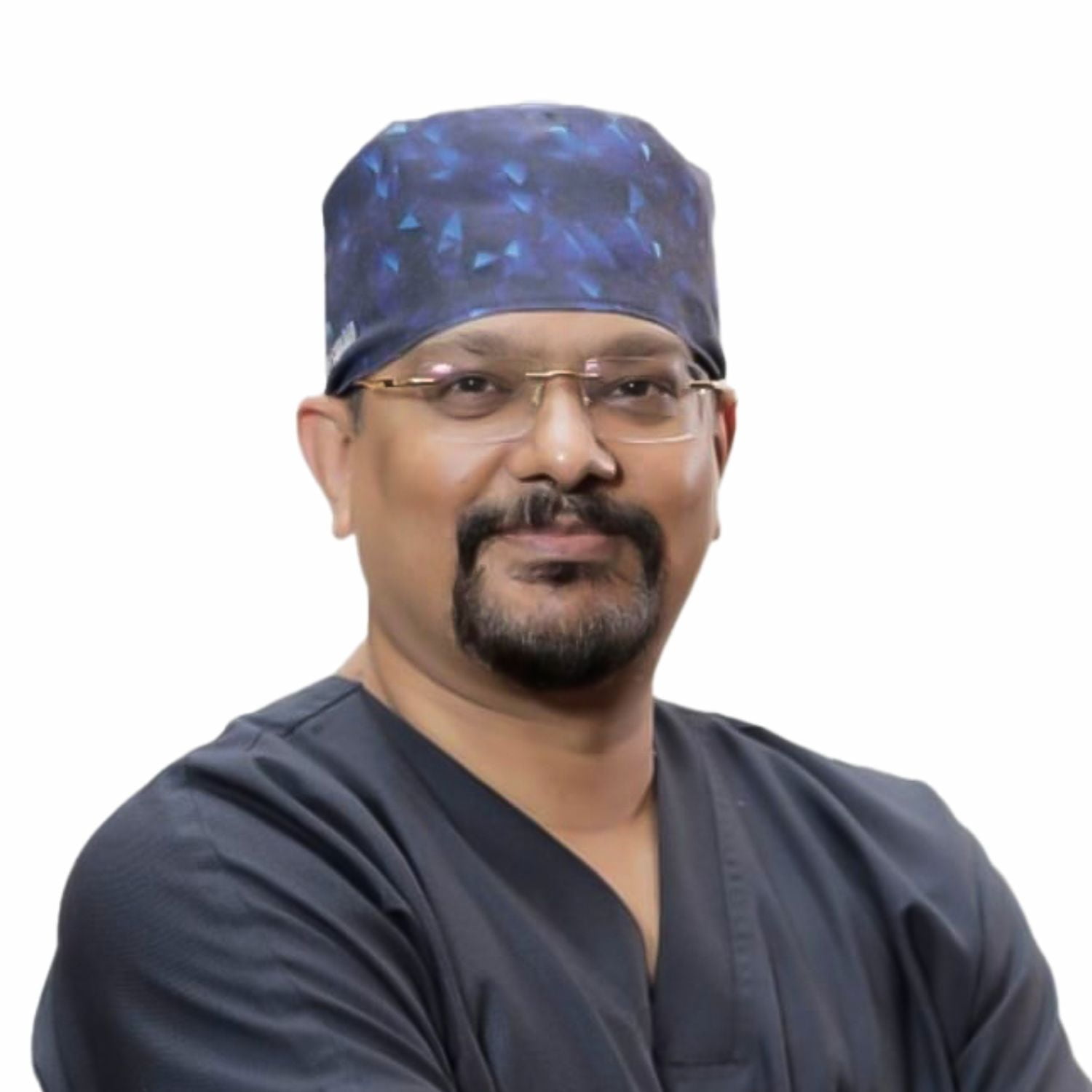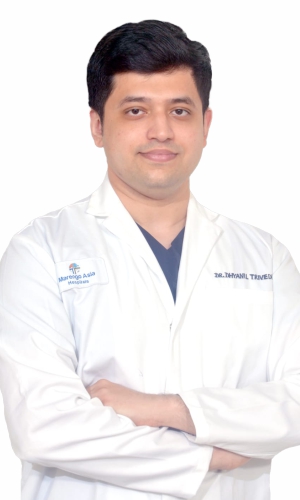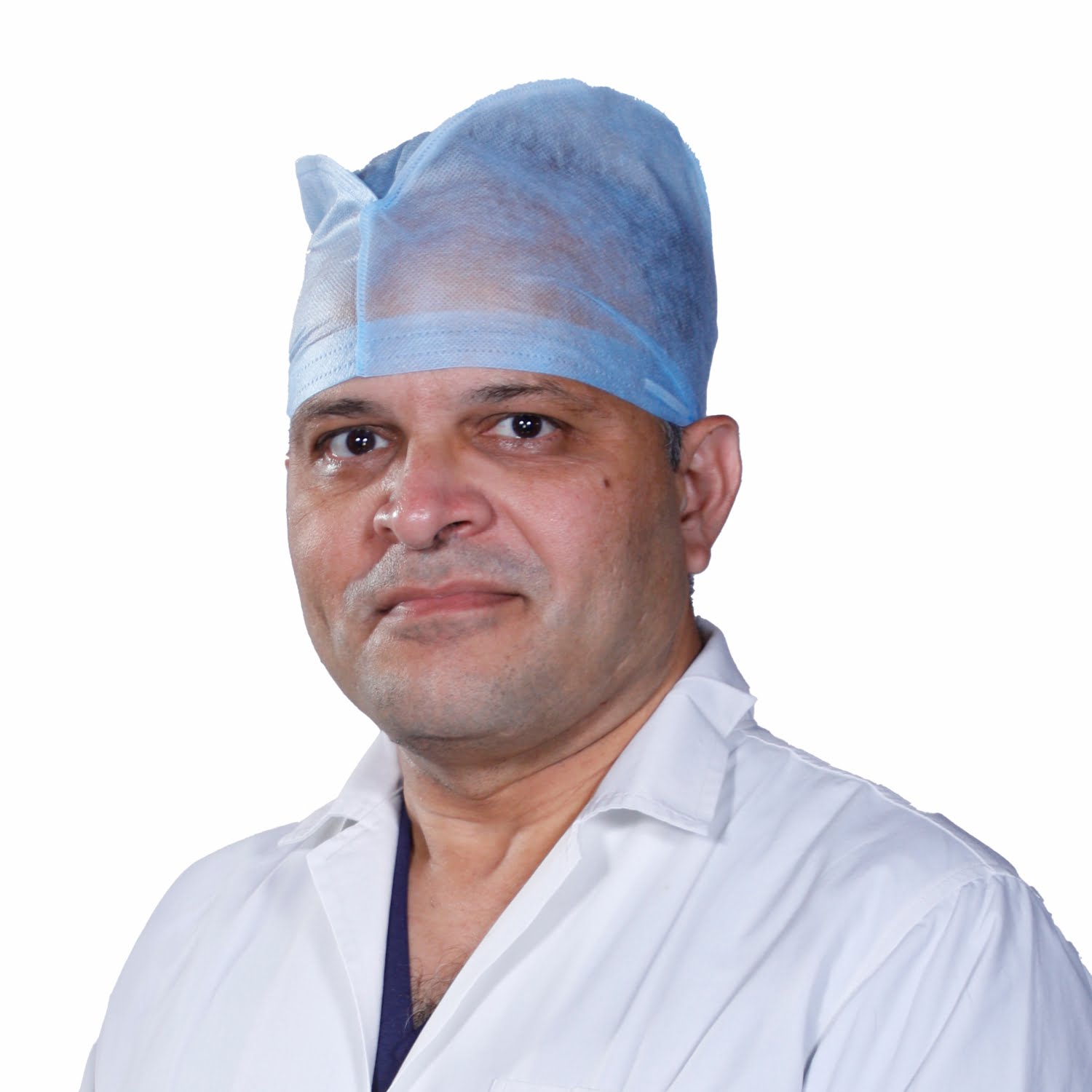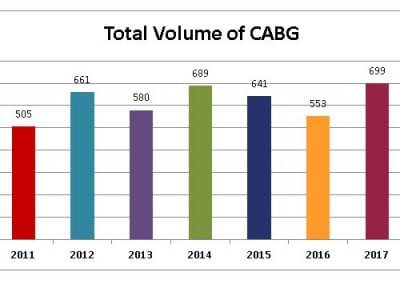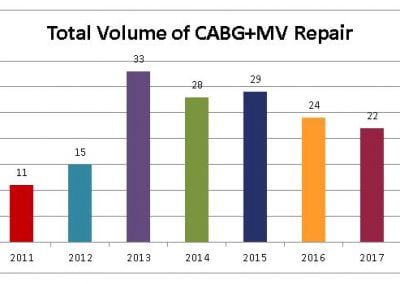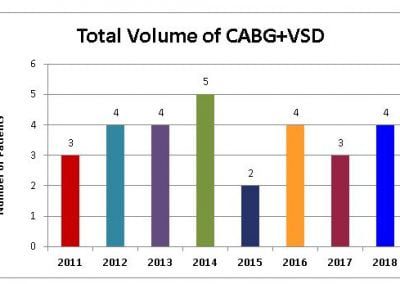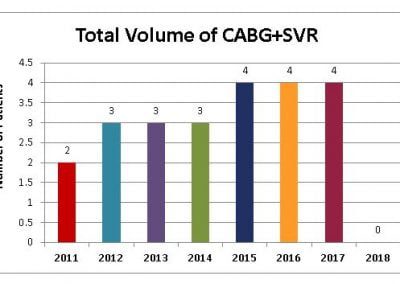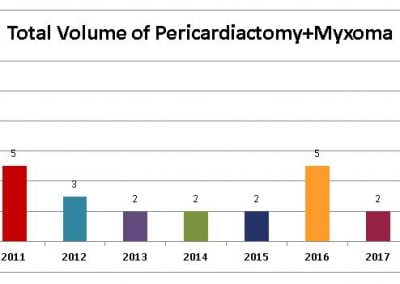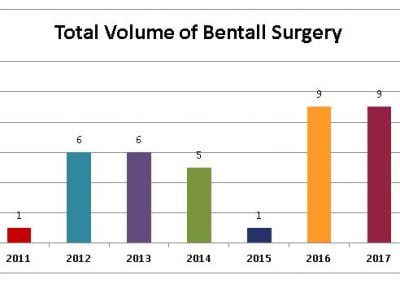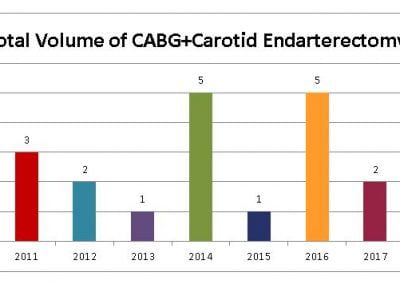- Cardiothoracic Surgery
- Our Doctors
- Heart Transplant
- CABG
- Heart Failure
- Valvular Diseases
- Septal Defects
- Other Surgeries
CARDIOTHORACIC SURGERY
- The cardiac and thoracic surgery team of Marengo CIMS Hospital is rated the best heart hospital in India and consists of highly skilled surgeons and anesthetists, setting a number of milestones in the field of cardiac surgery.
- Marengo CIMS Hospital is the best heart hospital in Ahmedabad and the foremost experts in Gujarat.
- In this department, surgery of heart or great vessels is performed by cardiac and thoracic surgeons including heart transplant. Frequently, it is done to treat complications of ischemic heart disease (for example, coronary artery bypass grafting), correct congenital heart disease, or treat valvular problems from various causes including endocarditis, rheumatic heart disease and atherosclerosis.
- Our surgeons have pioneered in MICS, valve replacement and repair surgery and CABG with EF <25%.
- Marengo CIMS cardiac surgeons treat infants and geriatric patients with equal expertise.
- With over 5000 cardiac and 500 thoracic surgeries completed in last 5 years with some outstanding results post-operatively, the eyes are set to develop CIMS Cardiothoracic Surgery Department as the best HEART TRANSPLANT CLINIC and soar as the benchmark in the health care sector of Gujarat.Marengo CIMS Hospital Multidisciplinary Team includes:
- Cardiothoracic Surgeon
- Cardiologist
- Anesthetist -Intensivist
- Perfusionist
- Nephrologist
- Critical care specialist
- Neurologist
- Pulmonologist
- Physiotherapist
- Hematologist
- Nurse Coordinator
The Best Heart Surgery & Transplant Facilities in India
- 3 Class 100 laminar air flow modular operation theaters only devoted to cardiac surgery
- Positive and Negative isolation chambers in the SICU
- 21 bed surgical intensive care unit
- Special Heart Transplant ICU
We are expert at
- Bypass surgery- CABG
- Mitral Valve Repair
- Congenital heart surgery
- Pediatric Cardiac Surgeries
- Single, double & multiple valve replacement/repair
- Aortic root replacement
- Combined carotid and bypass procedure
- PDA, ASD, VSD,TOF etc
- CABG with SVR for CAD,LV dysfunction, CHF
- Hypertrophic cardiomyopathy surgery – septal myectomy
- Heart failure surgery – left ventricular assist devices, left ventricular reconstruction, Heart Transplant and other innovative surgeries
- Aneurysm
The Cardiac Team at Marengo CIMS Hospital are the best at heart transplants in Ahmedabad. We have performed six successful heart transplants under the guidance of the best cardiac team in Ahmedabad and Gujarat. For all your heart failure treatment requires Marengo CIMS Hospital is the best hospital for your needs. Book an appointment with one of our best doctors in Ahmedabad and Gujarat.
Amit Chandan
Dr. Amit Chandan
Cardiac Surgery
MBBS, DNB (Cardiothoracic Surgery)
Consultant Cardiothoracic and Vascular Surgeon
Overview :
Dr. Amit Chandan is one of India’s leading cardiothoracic surgeons. In his career, he has participated in over 10,000 heart surgeries. Apart from CIMS Hospital, Dr. Chandan also visits K. K. Hospital at Bhuj.
After completing MBBS, he pursued 6 years DNB Cardiothoracic Surgery. Dr. Chandan has experience of 12 years as a Cardiothoracic and Vascular Surgeon. In the past, Dr. Chandan has accumulated experience in different capacities at numerous hospitals including K B Bhabha Hospital (Mumbai), Sir H. N. Hospital (Mumbai), Jaslok Hospital (Mumbai), Jagjivan Ram Railway Hospital (Mumbai). He has also being to Germany to learn Minimal Invasive Cardiac Surgery and Ventricular assist devices.
He has a rich experience in performing all types Adult cardiac surgeries (CABG, Valve repair and replacement, complex Aortic surgery, HOCM, infective endocarditis, heart failure, atrial fibrillation, pulmonary thromboendarterectomy), Redo Cardiac surgery, Minimally invasive cardiac surgery (CABG, Valve repair and replacement, ASD, atrial fibrillation), Hybrid surgeries, Heart Transplant, ECMO and LVAD insertion.
Dr. Chandan regularly participates in several workshops, training courses, as well as conferences worldwide in order to keep up on with the latest in the field of Cardiothoracic and vascular surgery.
He is a member of the Indian Society for Heart and Lung Transplantation (INSHLT) and Indian Association of Cardiovascular-Thoracic Surgeons (IACTS).
He is actively involved in many research projects and has many publications to his credit. He has also made several presentations at National conferences.
Dr. Chandan has been teaching and training medical students, house officers, nurse surgical assistants as well as surgical trainees.
Areas of Expertise :
Adult Cardiac Surgery, Minimal Invasive Cardiac Surgery, Aortic Surgeries, Mitral valve Repair, Heart Transplant, Redo Surgery.
Awards & Accolades :
- Non-Hodgkins Lymphoma Involving Multiple Cardiac Chambers with Skeletal Muscle Involvement in a Hepatitis C Positive Patient.
- Prevalence of Genetic variations Affecting Warfarin Action from Different Parts of India.
- A Late Coronary Stent Infection: Its Diagnosis and Surgical Treatment-A Case Report.
Procedure & Treatment :
- Coronary artery bypass grafting (CABG)
- Mitral Valve repair/replacement surgery
- Aortic Valve replacement
- Minimal Invasive Cardiac Surgery (MICS)
- Heart Transplant
- Atrial septal defect (ASD) repair
- LA myxoma surgery
- Hypertrophic Obstructive Cardiomyopathy (HOCM)
- Ventricular pacing lead placement
- Hybrid Surgery
- Pulmonary Thromboendearterectomy
- Redo Cardiac Surgery
- ECMO
Amit Chandan
Consultant Cardiothoracic and Vascular Surgeon
Chintan Sheth
Dr Chintan Sheth
Cardiac Surgery
Consultant Anaesthesiologist and Critical Specialist
Experience :
• More than 10 years
Speciality
• Cardiac and Heart Transplant Anesthesiologist and Critical Care Specialist
Overview :
• Expert in pre op optimization and perioperative management of Cardiac surgeries from new born to geriatrics, Expert in Cardiac Critical Care
• Special interest in Heart Transplant and Heart Failure Management
Special interest in creating awareness about deceased organ donation
• Well versed with various Mechanical Circulatory Supports like ECMO, IABP
• Expert in Transesophageal as well as trans thoracic Echocardiography
Procedure & Treatment
• Cardiac Anesthesia and Critical Care
• Invasive line insertion and monitoring
• Advanced hemodynamic monitoring.
• TEE
• ECMO
• Post operative pain management
Areas of Expertise
• Adult and Paediatric cardiac anesthesia
• Anesthesia and management of Heart Transplant patients
• Management of heart failure patients Cardiac Critical Care
• TEE-Transesophageal Echocardiography
• Mechanical Circulatory Support – IABP, ECMO, LVAD
Anesthesia for various Device closures (ASD, VSD, PDA) and various high risk Cathlab procedures.
• High risk non cardiac procedures in patients with cardiac diseases
Awards & Accolades
• Gold Medal in TEE (Transesophageal Echocardiography) by IACTА
• Fellowship in cardiac Anesthesia at Narayana Hrudayalaya, Bangalore
Mobile : +91 9173204454
Email : chintan.sheth@marengoasia.com
Chintan Sheth
Cardiothoracic-Anaesthetist & Intensivist
Dhaval Naik
Dr. Dhaval Naik
Cardiac Surgery
Doctor Experience – 23 Years
Cardiothoracic & Heart Transplant Surgeon,
Director, ECMO/ELSO Services, Marengo CIMS Hospital
Overview
Cardio-Thoracic Surgery training (DNB), Apollo Hospitals, Chennai, under Dr. M. R. Girinath, Advance Fellowship in Cardiac Surgery at Royal Prince Alfred Hospital, Sydney, Australia under Dr. Matthew Bayfield and Dr. Paul Bannon , Fellow of Minimally Invasive Cardiac Surgery at Herzzentrum, Leipzig, Germany under Dr. Mohr, Advanced Fellowship in ECMO/ELSO in at Regensburg, Germany under Prof. Alois Philipp & Thomas Muller, Advanced Fellowship in Heart-Lung Transplantation and Ventricular Assist. Devices in at St. Vincent’s Hospital, Sydney, Australia, Member, Research Committee, Abbott, Serdia
Areas of Expertise
Off-Pump CABG, Aortic Surgeries, Heart Transplant, Ventricular Assist Devices, Minimally Invasive Cardiac Surgery, Heart Valve Surgery.
Awards & Accolades
- First Minimally Invasive Cardiac Surgery Program in Gujarat, First ECMO Program in Gujarat, Pioneer in Heart Transplant Program of Gujarat, Ex. Executive Member, Indian Association of Cardiothoracic Surgeons (IACTS), India, Treasure , ECMO Society of India. Bestowed with an award for “Excellence and Innovation in Cardiothoracic Surgery” by BER group in Singapore – 2017, Received Dr K.Sharan Cardiology Excellence Award from Indian Medical Association, New Delhi
Mobile : +91 9099111133
Email : dhaval.naik@cims.org
Dhaval Naik
Cardiothoracic & Heart Transplant Surgeon
Dhiren Shah
Dr. Dhiren Shah
Cardiac Surgery
MB, MS, MCh (CVTS), FICS
Director – Consultant Cardiac Surgeon
Director – Heart Transplant Programme and Mechanical Circulatory Support (MCS) Programme
Overview :
A Heart Transplant & Cardiac Surgeon with an experience of more than 16000+ CABG surgeries & 50 Heart Transplants. First to perform Trans Aortic Transcatheter Aortic Valve Replacement (TAVR) in India. First in India to do Hybrid CABG.
Areas of Expertise :
- Heart Transplants
- Heart Failures
- Valve Surgery
- Complex Bypass Heart & Lung Surgeries
- Congenital Heart Disease
Memberships:
- Member of working committee of health ministry of India and ICMR for creating guidelines for cardiac surgery
- Member of work force committee for Government of Gujarat for Transplantation program in Gujarat .
Mobile : +91 9825575933
Email : dhiren.shah@cims.org
Dhiren Shah
Director – Consultant Cardiac Surgeon
Dhyanil Trivedi
Dr Dhyanil Trivedi
M.B.B.S., DrNB
Consultant Cardiothoracic and Vascular Surgeon
Marengo CIMS Hospital, Ahmedabad
Education:
- MBBS: Govt Medical College, Baroda, SSGH Hospital
- Post Graduate: DrNB Cardiothoracic and Vascular Surgery (Direct 6 years course) Narayana Hrudayalaya, Bengaluru
Experience:
- Consultant Cardiothoracic and Vascular Surgeon: SAL Hospital, Ahmedabad, May 2023 to December 2024
- Senior Resident Narayana Hrudayalaya, Bengaluru, May 2022 to May 2023
Expertise:
- Adult Cardiac Surgery
- Minimal Invasive Cardiac Surgery
- Adult Congenital Heart Surgery
- Aortic Surgeries
- Valve Repair Surgery
- Vascular Surgery
- ECMO Heart transplant/LVAD
Publication:
- Long term outcomes of Ross Procedure in all age groups at a tertiary care center in India.
- Long term outcomes of Ross Procedure in paediatric age groups at a tertiary care center in India
Membership:
- IACTS (INDIAN ASSOCIATION OF CARDIOTHORACIC SURGEONS)
- INSHLT (INDIAN SOCIETY OF HEART AND LUNG TRANSPLANTATION)
Dhyanil Trivedi
Cardiac Surgeon
Hiren Dholakia
Dr. Hiren Dholakia
Cardiac Surgery
MBBS, MD (Anaesthesiology)
Consultant Cardiac Anaesthesiologist
Education :
- MBBS, August 1993 to March 1998, Baroda Medical College, Gujarat
- MD (Anaesthesiology) , April 1999 to July 2002, Baroda Medical College, Gujarat
- PDCC – Post doctoral fellowship in Cardiovascular and Neuro Anaesthesia, Jan 2003 to Dec 2003, Shree Chitra Institute, Trivendrum
Experience :
- Working as a consultant cardiac anaesthesiologist at MCIMS Hospital from August 2009 till date.
- Worked as a consultant cardiac anaesthesiologist at Global Health Private Limited (Dr. Naresh.Trehan’s Medicity) from June 2007 to July 2009
- Escorts Heart Institute, New Delhi, Designation: 2nd year Attending from August 2004 to May 2007
- Worked as a center in-charge for Baroda center from Nov 2005 to Aug 2006.
- Conducted all types of cardiac surgery cases, Adult and Paediatrics both.
- Attending Anaesthesiologist, Asian Heart institute – Mumbai, Feb 2004 to Aug 2004.
- Assistant professor in general anaesthesia, Amrita institute, Kochi, Sep 2002 to Dec 2002
Expertise :
- Capable of managing Adult Cardiac cases (Off pump and on pump Coronary artery bypass grafting, Valve surgeries) as well as Paediatrics and Thoracic Surgery also
- Trained for managing minimally invasive cardiac surgeries (CABG, MVR / AVR and ASD Closure) robotics surgeries and port access surgeries.
Mobile : +91 9586375818
Email : hiren.dholakia@marengoasia.com
Hiren Dholakia
Cardiothoracic-Anaesthetist & Intensivist
Heart Transplant- Only Center in Gujarat currently performing Heart Transplants actively.
Because of awareness to organ donation in India, treatments for heart failure and heart transplants are increasing across the country.
Marengo CIMS Hospital in Ahmedabad achieved one of the rarest of feats by doing the 1st heart transplant surgery in Gujarat.Marengo CIMS Hospital has crossed 9 successful heart transplants as of June 2019.
What is a heart transplant?
A heart transplant is a surgery to remove a damaged or diseased heart and replacing it with a healthy donor, performed on patients with end stage heart failure or severe coronary artery disease heart when other medical or surgical treatments have failed. It is not considered to be a cure for heart disease, but a life-saving treatment intended to improve the quality of life for the recipients.
What is heart failure?
Heart failure occurs when the heart is unable to pump enough blood to meet the needs of the body. The typical symptoms of heart failure are shortness of breath, poor exercise tolerance, cough (especially at night), fatigue, and fluid retention. If heart failure symptoms and heart function cannot be improved by medications or surgery, heart transplant may be beneficial.
Marengo CIMS Hospital is known as the best heart failure hospital in Ahmedabad and recognised amongst the top heart failure hospitals in the world.
How is heart failure diagnosed?
Heart failure is diagnosed based on patient’s medical and family histories, a physical exam, and test results. The signs and symptoms of heart failure also are common in other conditions.
- The cause of heart failure is evaluated such as coronary heart disease (CHD), high blood pressure, or diabetes
- Other causes of patient’s symptoms are evaluated
- Find any damage to patient’s heart and check how well patient’s heart pumps blood
- Early diagnosis and treatment can help people who have heart failure live longer, more active lives.
After medical and family histories and physical exam, patent has to undergo certain tests. There are main 2 very simple tests that are primary – an echocardiogram and a blood test called NT-pro BNP (a hormone that rises in the blood as a response to a failing heart). The echocardiogram will measure the Ejection Fraction or EF which is a measure of how well the heart is contracting. BNP Blood Test checks the level of a hormone in patient’s blood called BNP. The level of this hormone rises during heart failure. Other tests are ECG (Electrocardiogram), Chest X-Ray, Doppler Ultrasound, Holter Monitor, Cardiac Catheterization, Coronary Angiography, Stress Test, Cardiac MRI and Thyroid Function Tests, which are done as and when needed.
Why is heart transplant performed?
Heart transplant is indicated in those who’ve experienced heart disease or heart failure due to a variety of causes, including:
- A congenital defect
- Coronary artery disease
- Valvular heart disease
- A weakened heart muscle, or cardiomyopathy
Marengo CIMS Hospital is the best heart transplant hospital in Ahmedabad and Gujarat and we have the highest volume for heart transplants in Gujarat with a 100% success rate for the transplant.
How is a heart transplant performed?
A heart transplant is carried out under general anaesthesia and normally takes between four and six hours. The transplant should be performed within 2 hours from the brain death. Patent is connected to a heart-lung bypass machine, which will take over the functions of the heart and lungs while the transplant is being carried out. Marengo CIMS Hospital is the best heart transplant center in Ahmedabad, Gujarat and perhaps even in India with one of the highest heart transplant success rates across the country.
The procedure:
- The surgeon makes a cut (incision) down the chest of the patient over breastbone and the bone is separated, allowing the surgeon to access the heart
- Then the heart is removed, leaving behind a section of the right and left atria, the two upper chambers of the heart
- The new heart is connected to the aorta, the main artery from the heart, the pulmonary artery, and the remaining part of the atria
- The bypass machine should be taken off when the new heart starts beating.
- The breastbone will be closed with metal wires, and the tissues and skin will be closed with stitches.
After the operation
Once the transplant is complete, the patient will be moved to an intensive care unit (ICU). A machine called a ventilator will assist in breathing, and a tube will be inserted into a vein to provide with fluid and nutrients. These will normally be removed after a few days.
Pain relief is also provided as required.
Most people are well enough to move from the ICU and into a hospital ward within a few days.
Patient will be able to leave hospital within two or three weeks, although they need to have regular follow-up appointments and take medication to help stop their body rejecting patient’s new heart.
What are the risks associated with Heart Transplants?
A heart transplant is a major operation, and there is a risk of several complications.
Some complications can occur soon after the procedure, while others may develop months or even years later.
The main risks associated with a heart transplant are described below.
- Rejection
This is where the immune system recognises the transplanted heart as foreign and attacks it. Rejection usually occurs in the days, weeks or months after the transplant, although it can sometimes happen years later. Immunosuppressant medication can reduce the risk of this happening, but can’t always prevent it completely.
- Graft failure
In this the donated heart fails and doesn’t work properly. It occurs in 5-10% of people who’ve had a heart transplant, and can be fatal.
- Immunosuppressant side effects
The immunosuppressant medications needed to prevent rejection can have a number of significant side effects.
- Infections
Immunosuppressant medication will weaken patient’s immune system and make the patient more vulnerable to infection.
- Narrowed arteries
Narrowing and hardening of the blood vessels connected to the donor heart is a common long-term complication of a heart transplant.
Outcome after first heart transplant
Cardiac transplantation remains the treatment of choice for many patients with end-stage heart failure (HF) with severely impaired functional capacity despite optimal medical therapy. Although barriers to long-term survival remain, the outcome among transplant recipients has improved over several decades as a result of careful recipient and donor selection, advances in immunosuppression, and the prevention and treatment of opportunistic infections.
Receiving a new heart can improve quality of life considerably, but one has to take good care of it. In addition to taking daily anti-rejection medications, the recipient needs to follow a heart-healthy diet and lifestyle as prescribed by doctor. This includes not smoking and exercising on a regular basis.
Survival
Approximately 50 – 60% patient survive more than 12 years. Their results are as god as kidney transplant Survival rates for people who’ve had a heart transplant vary according to their overall health status, but averages remain high. Rejection is the main cause for a shortened life span.
Coronary Artery Bypass Surgery (CABG)
As a solution of blocked and narrowed vessel and compromised blood flow to heart due to it ,a graft is obtained from other part of the body and is attached above and below the blockade so as to divert the blood flow.
Bypass could be performed in two ways:
On Pump CABG: It is also known as Open Heart Surgery. Heart’s and lung’s functions are replaced with a machine known as “Heart-Lung Machine”. The process of such replacement of function is known as extracorporeal (outside the body) membrane oxygenation (ECMO). The operator/technician responsible for handling and use of the equipment is known as perfusionist.
The heart-lung machine is made up of majorly three parts: a pump (either non-occlusive or occlusive roller pump), a blood oxygenator, and a blood warming device. Through plastic tubing, connection of these three parts with anatomical heart is made. Deoxygenated blood is pumped to oxygenator to remove carbon dioxide from blood. Oxygenated blood is thereafter pumped to respective artery/vein of the body.
Schematic block diagram for orientation of position of Heart Lung Machine:
Off-pump CABG: Beating Heart Surgery
Another technique with advantage of lesser patient harm is known as off-pump CAB (OPCAB) as it doesn’t utilize any pump. It doesn’t require heart lung machine. The surgery is performed on beating heart that’s why it is called as “beating heart surgery” – a highly precise, complex and skill demanding procedure. We are proud that our cardiothoracic surgery team has exceptionally excelled in this technique and has shown continued commitment towards patient safety.
Minimally invasive coronary artery bypass
We also perform MICS-CABG which seems like a boon as according to name itself; it requires a very minimal invasion similar to that made using a key i.e. keyhole. We have great success in patients with Left Ventricular Ejection Fraction (LVEF) even less than 25% i.e. critical heart failure patients.
Implantable left ventricular assist device (LVAD):
An LVAD is a kind of artificial heart pump. It is used to treat people with severe heart failure and is sometimes given to people on the waiting list for a heart transplant. Normally, the left ventricle, one of the heart’s four chambers, pumps blood into the aorta (the large artery leaving the heart) and around the body. In the event that someone has severe heart failure, the heart is too weak to pump enough blood around the body. Some patients being considered for a heart transplant may need to have an LVAD implanted if they are unlikely to survive until a suitable donor heart becomes available. The device helps the failing heart and aims to restore normal blood flow.
Left Ventricular Reconstruction
After a heart attack in the left lower chamber of the heart (left ventricle), scar tissue will form in the left chamber. As the time passes this scar tissue can weaken and thin out to become an aneurysm–an abnormal bulge of tissue. This aneurysm–in conjunction with other heart problems–can cause the heart to enlarge, reducing its ability to pump blood effectively, resulting in heart failure.
In a ventricular reconstruction surgery, surgeons remove part of the aneurysm scar tissue to reshape the heart and restore it to its normal, conical shape. Typically, a small patch is sewn into place where the aneurysm once was. With the patch in place, surgeons sew tissue over the patch. Other procedures, such as valve repair or coronary artery bypass may be performed during the ventricular reconstruction operation.
CIMS Cardiothoracic surgery unit has established a dedicated unit for surgical /interventional procedures for valvular diseases including left atrial appendage ligation and electro cautery maze. The diseased valves could be either repaired or replaced based on its diseased condition’s severity and surgery recommendations.
CIMS Valvular clinic has both repairs and replacement solutions for:
- Mitral Valve (Common problems are Mitral Regurgitation and Mitral Stenosis)
- Tricuspid Valve
- Aortic Valve (Common problems are Aortic Stenosis and Aortic Regurgitation)
- Pulmonic Valve
Latest technologies like Left Atrial Appendage Occlusion (LAAO) Device and MitraClip are also considered to be future of CIMS valvular clinic.
Septal Defects:
It is a disorder where due to abnormality (majorly hole in septum separating two chambers of ventricles), a portion of blood from one chamber enters to another. Thus, it is sent back for oxygenation even after being oxygenated. This causes increase in load to heart and also causes gradual damage to lungs.
Tetralogy of Fallot:
It is a group of four diseased conditions in the heart, which is a congenital abnormality. It is characterized by the following: a large ventricular septal defect (VSD), pulmonary stenosis, right ventricular hypertrophy and an overriding aorta.
As a solution of blocked and narrowed vessel and compromised blood flow to heart due to it ,a graft is obtained from other part of the body and is attached above and below the blockade so as to divert the blood flow.
Pediatric Cardiac Surgeries
We have unique expertise in surgical management of paediatric cardiac diseases and/or congenital cardiac diseases with full time availability of paediatric cardiologists, paediatric cardiac surgeon and latest diagnostics technologies including fetal echo.
Aortic surgery
CIMS cardiothoracic surgeons treat diseases on ascending aorta, aortic arch, descending aorta including thoracoabdominal repairs, thoracic and abdominal aorta endovascular stent graft procedures which are all performed by a multidisciplinary surgical team.
For ascending thoracic and abdominal aorta aneurysms, a minimally invasive endovascular approach is becoming the preferred method, decreasing morbidity and mortality in these patients when performed by a skilled team. We use the endovascular approach for thoracic aorta aneurysm surgery.
MAZE Procedure for Treatment of Atrial Fibrillation
Atrial Fibrillation (AF) is an abnormal heart rhythm where the upper chambers of the heart contract in an uncoordinated fashion and start rapid and irregular beating. AF is dangerous because it may cause blood to pool in these chambers. The pooled blood can lead to clumps of blood called blood clots. A stroke can occur if a blood clot travels from the heart and blocks a small artery in the brain.
Maze surgery cures AF by creating a “maze” of new electrical pathways to let electrical impulses travel easily through the heart. Our team recommend Maze surgery if AF cannot be treated with medicines or other treatments. During the procedure, a number of incisions are made on the left and right atrium to form scar tissue, which does not conduct electricity and disrupts the path of abnormal electrical impulses. The scar tissue also prevents erratic electrical signals from recurring. After the incisions are made, the atrium is sewn together to allow it to hold blood and contract to push blood into the ventricle.
Hypertrophic cardiomyopathy surgery – septal myectomy
Septal myectomy is the gold-standard therapy for hypertrophic obstructive cardiomyopathy (HOCM). The surgery entails removing a portion of the septum that is obstructing the flow of blood from the left ventricle to the aorta. Septal myectomies have been successfully performed for more than 25 years. The alternatives to septal myectomies are treatment with medication (usually beta or calcium blockers) or non-surgical removal of tissue with alcohol ablation. Ordinarily, septal myectomies are performed only after attempts at treatment with medication fail.

Contact Us
Toll Free Number : 1800 309 9999
Medical Helpline +91 70 69 00 00 00
Phone: 079 4805 1200 or 1008
+91 79 2771 2771 or 72
Ambulance: +91 98244 50000
Email: info@cims.org | opd.rec@marengoasia.com | marengocims.info@marengoasia.com
Location
Marengo Asia Healthcare Private Limited
CIN Number - U85100GJ2020PTC131504
Plot No. 67/1, Opp. Panchamrut Bunglows, Nr. Shukan Mall, Off Science City Road, Sola, Ahmedabad – 380 060
In case of any patient safety or quality-of-care related concern, please contact to JCI by clicking here.

